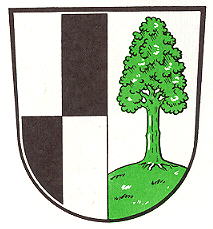Ahornberg: Difference between revisions
Knorrepoes (talk | contribs) No edit summary |
Knorrepoes (talk | contribs) m (Text replace - "'''Origin/meaning :'''<br/>" to "====Origin/meaning====") |
||
| Line 17: | Line 17: | ||
Gespalten; vorne geviert von Silber und Schwarz, hinten in silber ein grüner Ahornbaum auf grünem Berg. | Gespalten; vorne geviert von Silber und Schwarz, hinten in silber ein grüner Ahornbaum auf grünem Berg. | ||
====Origin/meaning==== | |||
The arms date from the 17th century. Ahornberg and some neighbouring villages were granted town rights and its own seal in 1663. The seal probably dates already from around 1600 and was used by the local village council. | The arms date from the 17th century. Ahornberg and some neighbouring villages were granted town rights and its own seal in 1663. The seal probably dates already from around 1600 and was used by the local village council. | ||
Revision as of 08:49, 1 April 2012
| Heraldry of the World Civic heraldry of Germany - Deutsche Wappen (Gemeindewappen/Kreiswappen) |
AHORNBERG
State : Bayern
District (Kreis) : Hof (until 1972 Münchberg)
Incorporated into : 1972 Konradsreuth
Official blason:
Gespalten; vorne geviert von Silber und Schwarz, hinten in silber ein grüner Ahornbaum auf grünem Berg.
Origin/meaning
The arms date from the 17th century. Ahornberg and some neighbouring villages were granted town rights and its own seal in 1663. The seal probably dates already from around 1600 and was used by the local village council.
The quartered shield is the arms of the Hohenzollern family, to whom the village belonged, the aspen (Ahorn) tree is a canting symbol.
Even though the arms date from the 17th century and the composition has not changed, the colours and the shape of the tree have differed widely during the centuries.
Literature : Stadler, 1990.

